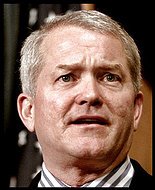Speaking of distant memories, there's no need to worry about the Mark Foley affair anymore. Tom DeLay's "Ethics" Committee says it's all OK now!
>
 Former Florida Rep. Mark Foley remains MIA, and you have to figure that the Republicans, with not a whole lot to be happy about, are grateful for that. There were indications--namely when the former congressman went public about his alleged abuse by a priest as a child--that he had a stake in keeping the scandal in the consciousness of the public, out of anger at the way his case was handled by his former leadership. And then you have to wonder if emissaries from that leadership haven't found their way to Foley to suggest to him why it would be in everyone's interest for him to retain his current low profile.
Former Florida Rep. Mark Foley remains MIA, and you have to figure that the Republicans, with not a whole lot to be happy about, are grateful for that. There were indications--namely when the former congressman went public about his alleged abuse by a priest as a child--that he had a stake in keeping the scandal in the consciousness of the public, out of anger at the way his case was handled by his former leadership. And then you have to wonder if emissaries from that leadership haven't found their way to Foley to suggest to him why it would be in everyone's interest for him to retain his current low profile.Now the House "Ethics" Committee--I don't see how you can avoid use of those quotation marks ever since Tom DeLay turned an already gap-toothed outfit into a truly toothless one--has finished its probe, and it turns out it's all OK. Actually, the committee's conclusions about the House Republican leaders' performance seem to a lot of people pretty devastating. It seems they all knew about Foley's inappropriate interest in the House pages (meaning, for one thing, that they all lied about it).
And yet, somehow, no action needs to be taken! Oh, maybe there were some bad apples, but they're all gone from Congress now, and so no longer Congress's problem. Of course, those guys have already suffered about the worst punishment they could have imagined: losing control of the House, and in part because of the Foley scandal. Still, is that really the only issue of accountability here?
The New York Times weighed in on the subject editorially today:
December 9, 2006
Editorial
Desperately Seeking Ethics
Watching our elected leaders in action, it's not surprising that Americans wonder if there is any limit to the crass misbehavior that members of Congress are willing to tolerate from their colleagues to protect their privileges and hold on to their own jobs. The House ethics committee answered that question yesterday with a resounding "No."
Sixty-four days after it promised to find out who knew about Representative Mark Foley's wildly inappropriate, sexually predatory behavior with teenage House pages, and why they failed to stop it, the bipartisan committee produced a report yesterday that was a 91-page exercise in cowardice.
The report's authors were clearly more concerned about protecting the members of the House than the young men and women under their charge in the page program. And they made absolutely no effort to define the high standard of behavior that should be required of all members of Congress and their staffs.
The report concludes that evidence of Mr. Foley's "creepy" interest in young male pages dated back to 1999. One woman who worked with the pages took to shadowing Mr. Foley when he was around them. The report makes clear that Mr. Foley's misconduct became known to an ever-widening circle of his colleagues and their aides, including Speaker Dennis Hastert. But no one made any serious attempt to stop Mr. Foley or reveal his misdeeds. A few urged him to cut it out, for political reasons, but did not follow up.
The committee concluded that other people preferred to remain willfully ignorant — to protect Mr. Foley's secret homosexuality, to avoid partisan embarrassment or for other political reasons.
But even after all that, the report said that none of this amounted to the sort of behavior that might discredit the House of Representatives and thus violate ethics rules. The committee, which never heard from Mr. Foley, did not call for disciplinary action against current members of the House or their staffs. The committee said those who have already left, like Mr. Foley, were no longer its problem.
The panel's justification for inaction is a breathtaking exercise in sophistry: "the requirement that House members and staff act at all times in a manner that reflects creditably on the House does not mean that every error in judgment or failure to exercise greater oversight or diligence" is a violation.
No, not every error or failure should be a violation, but certainly the ones that lead to an elected official's sexually stalking teenage boys while his colleagues turn a blind eye or cover it up should be. We'd set the bar at least there. Apparently, it's too high for the House.



0 Comments:
Post a Comment
<< Home